
Nguyen Phu Trong’s visit to France marks a new milestone in Vietnam-France relations
Latest
| TIN LIÊN QUAN | |
| Party chief Nguyen Phu Trong active in France | |
| Vietnam-France bilateral trade enjoys continuous growth | |
Can you share your thoughts on the meaning of the General Secretary’s visit?
The official visit of General Secretary Nguyen Phu Trong carries important meaning for both countries.
Firstly, this is the highest-level meeting between Vietnam and France since Emmanuel Macron was elected French President.
Secondly, the visit is taking place during a time when the two countries are undergoing many important developments. France has undergone profound social changes since 1958 (when the 5th Republic was established) with the defeat of the two traditional parties and the victory of President Macron's newly formed LREM (La République En Marche), which is now making drastic reforms both economically and socially. Vietnam has also seen great progress over recent years, with an annual economic growth rate of 6-7%, political stability and the great success of external affairs. Specifically, the position of Vietnam has been significantly elevated by the success of the APEC Leaders’ Week 2017 in Da Nang.
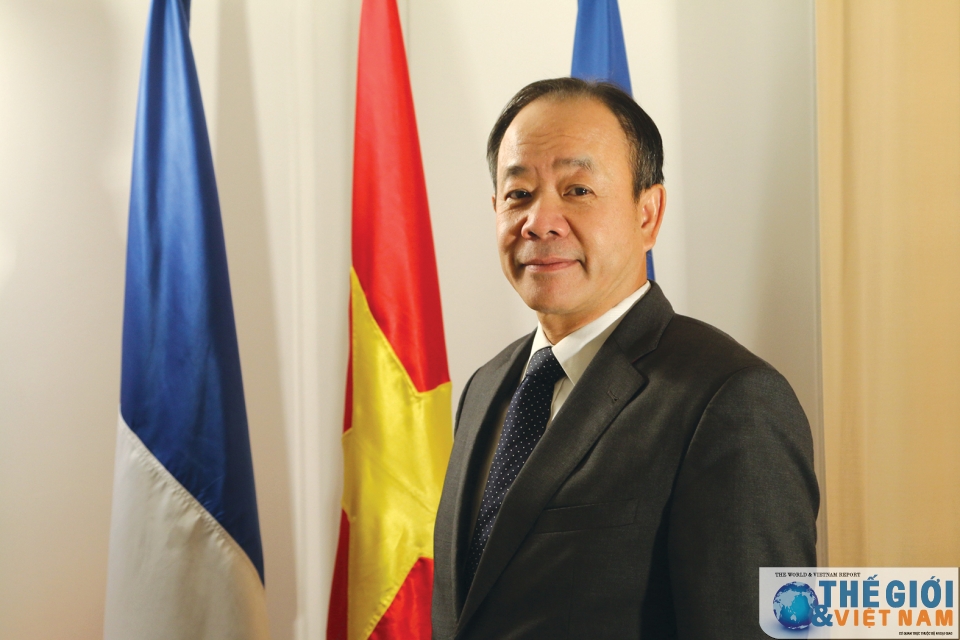 |
| Vietnamese Ambassador to France Nguyen Thiep. |
Therefore, this is a good time for top leaders of the two countries to exchange new frameworks and cooperation mechanisms to further deepen the Vietnam-France Strategic Partnership.
Moreover, the General Secretary’s visit is taking place on the occasion of the 45th anniversary of Vietnam – France diplomatic ties. The results of the visit will deepen and broaden cooperation, which better corresponds to the expectation of the two sides and matches the new position of France in Europe and the EU as well as Vietnam in ASEAN, Southeast Asia and the Pacific region.
The visit is also an opportunity for Vietnam to meet and thank its French counterparts who supported Vietnam in the Paris Peace Treaty, which marks 45 years since the war ended and the restoration of peace in Vietnam. This is also an important diplomatic event, marking the victory of Vietnam.
In brief, the visit of the General Secretary to France will be a turning point for the friendship and cooperation between the two countries.
Could you explain the traditional cooperation between the two countries?
Vietnam and France have a long traditional relationship, which enhances the ties between the two nations. On April 12, 1973, the two countries officially established diplomatic relations at the Ambassadorial level. Over the course of history, bilateral relations have flourished based on close ties in history and culture.
At present, the cooperation between the two countries is comprehensive, effective and increasingly open with many mechanisms and channels in all fields, including politics-diplomacy, defense-security, culture, education-training, science, justice and health.
Additionally, people-to-people exchanges and friendship between the two countries have strengthened, especially through cooperation between localities (also known as non-cooperative mechanisms) – a unique feature of this bilateral relationship.
With this background and successful synergy, in 2013, the two countries upgraded ties to Strategic Partnership – a new, stable and long-term partnership framework. Now, after five years, Vietnam and France are witnessing an opportunity to elevate the ties to a higher level, which better corresponds to the status, potential and traditional history of the two countries.
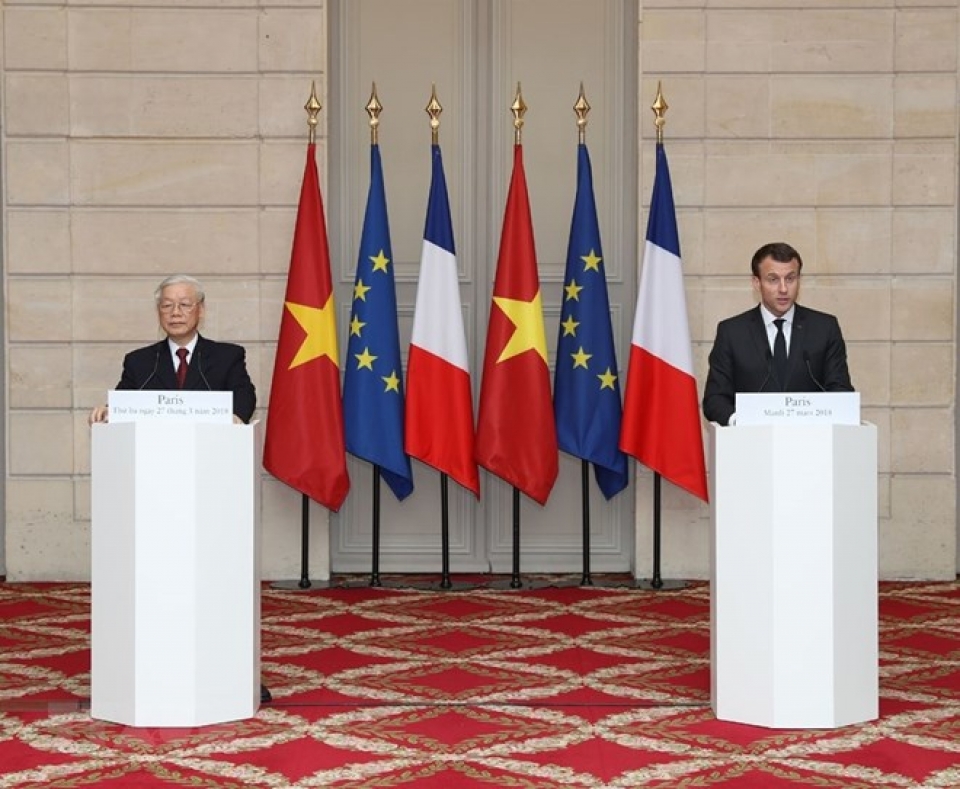 |
| General Secretary Nguyen Phu Trong and President Emmanuel Macron at the press conference. (Photo: VNA) |
Economic cooperation between Vietnam and France is growing, but according to the statistics, France only ranked 16th out of 125 countries and territories investing in Vietnam. What plans does the Vietnamese Embassy in France have to attract more investment from France?
By the end of 2017, France had 512 on-going investment projects in Vietnam, with total registered capital of about 2.8 billion USD. This is a small number compared to the potential of a G7 economy, which is currently ranked fifth in the world with advanced technology, good capital sources and close ties with Vietnam.
In order to attract more investment, especially 20 years since the first French businesses entered the Vietnamese market, the Embassy will do its utmost to further promote dialogue and increase its effectiveness between the French and Vietnamese agencies, contributing to strengthening cooperation in the fields of economics, investment and trade.
The embassy will actively promote new projects through measures such as coordinating with the Association of Employers, the Chamber of Commerce and Industry and other localities in France to hold meetings between top leaders and leaders of ministries, branches and localities of Vietnam with French enterprises; organising business forums in France; arranging French business delegations to visit Vietnam and explore investment opportunities based on a thorough assessment of the needs and potential of the parties.
Promoting the Vietnamese investment environment is also very important. Vietnam has many advantages, for example, a stable social-politic environment, high growth rate, large market with a rapidly growing middle class, increasing business index and young workforce that are becoming more and more skilled.
In the future, what areas should the two countries focus on to best exploit the traditional relationship?
First, the two sides should continue to promote political-diplomatic cooperation, enhance high level exchanges, and improve the effectiveness of existing cooperation mechanisms such as the Strategic Dialogue between the Ministry of Foreign Affairs and the Ministry of Defense, exchange of delegations between the parliaments, and non-cooperative cooperation (38 localities in France have partnerships with 18 provinces in Vietnam).
Second, the two sides should strengthen defence and security collaboration, including medical, hydro and oceanographic training; join the peacekeeping force of the United Nations; enhance cyber security, defence industry, rescue operations; promote exchanges of senior officials and experts; improve the effectiveness of the Vietnam-France Joint Committee on National Defence Cooperation.
Third, the two sides need to upgrade cooperation in trade and investment through improving the quality of the annual high-level economic dialogue mechanism, expanding trade and investment promotion, and creating favorable conditions for businesses of the two countries to participate more extensively in each other's markets.
Fourth, in terms of development cooperation, the two sides should uphold the partnership in implementing the United Nations Sustainable Development Goals and commitments under the Paris Agreement on climate change. Both sides will also discuss ways to increase ODA effectiveness. France is the leading ODA donor for Vietnam, with total committed capital of 18.4 billion USD (1993). In 2017, Vietnam has disbursed 104 million USD.
Fifth, the two sides should review to improve the effectiveness of existing frameworks and cooperation mechanisms in the fields of culture, tourism, education and training, science and technology, legislation and judiciary, health and language. The two nations also need to discuss and set out frameworks and cooperation mechanisms to better respond to the new situation and to expand cooperation in the digital economy to approach and exploit the benefits of the Fourth Industrial Revolution.
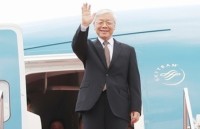 | Party General Secretary leaves for official visit to France General Secretary of the Communist Party of Vietnam (CPV) Central Committee Nguyen Phu Trong and a high-raking Vietnamese delegation left Ha Noi on March 25 ... |
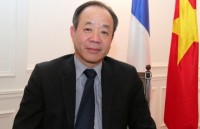 | New development in Vietnam – France strategic partnership The upcoming visit to be made by General Secretary of the Communist Party of Vietnam (CPV) Central Committee Nguyen Phu Trong to France from March ... |
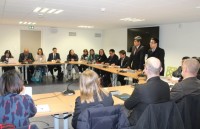 | Vietnam, France share experience in organic agriculture Close to 20 businesses from Vietnam and France gathered at a forum in Paris on February 26 to exchange know-how in organic agricultural production. |

















